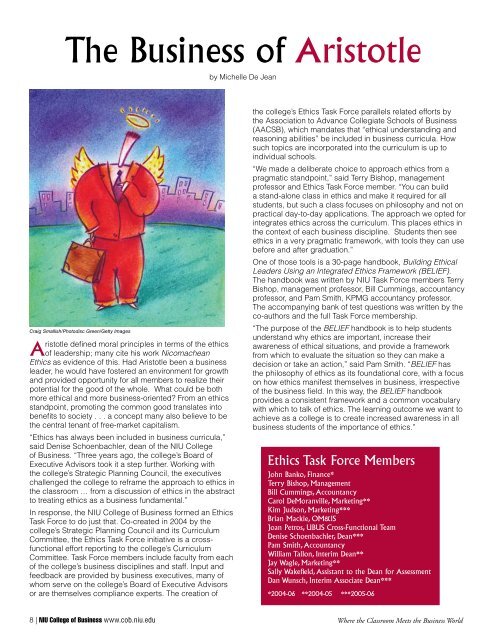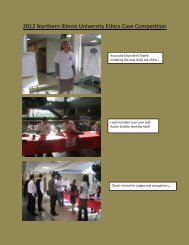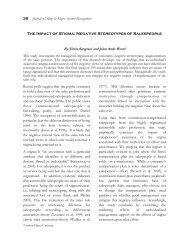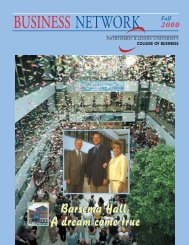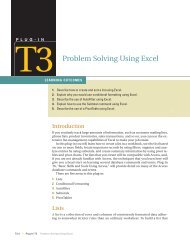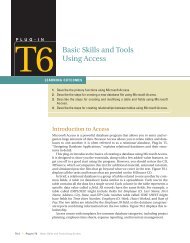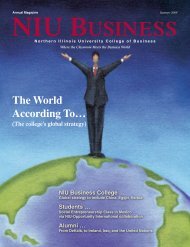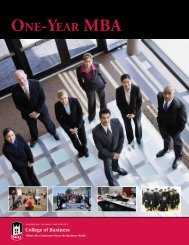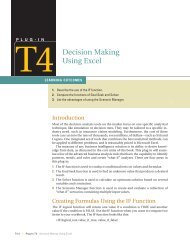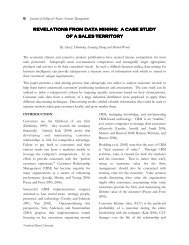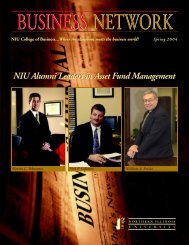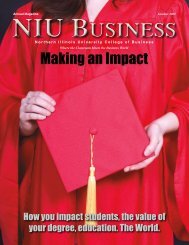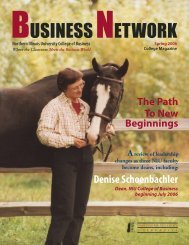The <strong>Business</strong> <strong>of</strong> Aristotleby Michelle De JeanCraig Smallish/Photodisc Green/Getty ImagesAristotle defined moral principles in terms <strong>of</strong> the ethics<strong>of</strong> leadership; many cite his work NicomacheanEthics as evidence <strong>of</strong> this. Had Aristotle been a businessleader, he would have fostered an environment for growthand provided opportunity for all members to realize theirpotential for the good <strong>of</strong> the whole. What could be bothmore ethical and more business-oriented? From an ethicsstandpoint, promoting the common good translates intobenefits to society . . . a concept many also believe to bethe central tenant <strong>of</strong> free-market capitalism.“Ethics has always been included in business curricula,”said Denise Schoenbachler, dean <strong>of</strong> the <strong>NIU</strong> <strong>College</strong><strong>of</strong> <strong>Business</strong>. “Three years ago, the college’s Board <strong>of</strong>Executive Advisors took it a step further. Working withthe college’s Strategic Planning Council, the executiveschallenged the college to reframe the approach to ethics inthe classroom … from a discussion <strong>of</strong> ethics in the abstractto treating ethics as a business fundamental.”In response, the <strong>NIU</strong> <strong>College</strong> <strong>of</strong> <strong>Business</strong> formed an EthicsTask Force to do just that. Co-created in 2004 by thecollege’s Strategic Planning Council and its CurriculumCommittee, the Ethics Task Force initiative is a crossfunctionaleffort reporting to the college’s CurriculumCommittee. Task Force members include faculty from each<strong>of</strong> the college’s business disciplines and staff. Input andfeedback are provided by business executives, many <strong>of</strong>whom serve on the college’s Board <strong>of</strong> Executive Advisorsor are themselves compliance experts. The creation <strong>of</strong>the college’s Ethics Task Force parallels related efforts bythe Association to Advance Collegiate Schools <strong>of</strong> <strong>Business</strong>(AACSB), which mandates that “ethical understanding andreasoning abilities” be included in business curricula. Howsuch topics are incorporated into the curriculum is up toindividual schools.“We made a deliberate choice to approach ethics from apragmatic standpoint,” said Terry Bishop, managementpr<strong>of</strong>essor and Ethics Task Force member. “You can builda stand-alone class in ethics and make it required for allstudents, but such a class focuses on philosophy and not onpractical day-to-day applications. The approach we opted forintegrates ethics across the curriculum. This places ethics inthe context <strong>of</strong> each business discipline. Students then seeethics in a very pragmatic framework, with tools they can usebefore and after graduation.”One <strong>of</strong> those tools is a 30-page handbook, Building EthicalLeaders Using an Integrated Ethics Framework (BELIEF).The handbook was written by <strong>NIU</strong> Task Force members TerryBishop, management pr<strong>of</strong>essor, Bill Cummings, accountancypr<strong>of</strong>essor, and Pam Smith, KPMG accountancy pr<strong>of</strong>essor.The accompanying bank <strong>of</strong> test questions was written by theco-authors and the full Task Force membership.“The purpose <strong>of</strong> the BELIEF handbook is to help studentsunderstand why ethics are important, increase theirawareness <strong>of</strong> ethical situations, and provide a frameworkfrom which to evaluate the situation so they can make adecision or take an action,” said Pam Smith. “BELIEF hasthe philosophy <strong>of</strong> ethics as its foundational core, with a focuson how ethics manifest themselves in business, irrespective<strong>of</strong> the business field. In this way, the BELIEF handbookprovides a consistent framework and a common vocabularywith which to talk <strong>of</strong> ethics. The learning outcome we want toachieve as a college is to create increased awareness in allbusiness students <strong>of</strong> the importance <strong>of</strong> ethics.”Ethics Task Force MembersJohn Banko, Finance*Terry Bishop, ManagementBill Cummings, AccountancyCarol DeMoranville, Marketing**Kim Judson, Marketing***Brian Mackie, OM&ISJoan Petros, UBUS Cross-Functional TeamDenise Schoenbachler, Dean***Pam Smith, AccountancyWilliam Tallon, Interim Dean**Jay Wagle, Marketing**Sally Wakefield, Assistant to the Dean for AssessmentDan Wunsch, Interim Associate Dean****2004-06 **2004-05 ***2005-06 | <strong>NIU</strong> <strong>College</strong> <strong>of</strong> <strong>Business</strong> www.cob.niu.eduWhere the Classroom Meets the <strong>Business</strong> World
“The Ethics Handbook, developed by the <strong>Northern</strong> <strong>Illinois</strong>University <strong>College</strong> <strong>of</strong> <strong>Business</strong> … presents a useful guidefor management educators and employers who seek todevelop ethical standards and instructional materials.”“And increasedawareness <strong>of</strong> the toolsto evaluate ethicaldilemma,” addedBill Cummings. “TheBELIEF handbookoutlines a decisionmakingguide. Theguide identifiesspecific actionsused in the ethical decision making process. We includethe decision-making guide in the handbook itself and alsoprinted it onto a card that fits in a wallet. Other tools listed inthe handbook include pr<strong>of</strong>essional codes within industry, thecompany codes <strong>of</strong> firms sponsoring this project, and the <strong>NIU</strong>business school Code <strong>of</strong> Ethics, which was written by and forour students.”The BELIEF handbook and the decision-making card weredistributed to all <strong>NIU</strong> business students in fall 2006. Studentsalso have online access to the material, including the testquestions component which each student is required tosuccessfully complete.Even before its rollout, the BELIEF handbook wasenthusiastically received by both the academic andpr<strong>of</strong>essional communities. <strong>NIU</strong> business faculty presentedthe BELIEF Initiative as part <strong>of</strong> a practice sharing sessionduring the August 2006 American Accounting AssociationNational Conference, at which time the faculty fieldedmultiple requests from fellow attendees who asked for copies<strong>of</strong> the handbook. The work <strong>of</strong> the <strong>NIU</strong> Ethics Task Force wasfavorably mentioned by John Fernandes, AACSB presidentand CEO, during a 2005 AACSB Ethics Conference.Afterwards, faculty from universities throughout the U.S.and around the world contacted the college seeking copies<strong>of</strong> the handbook for use in their classes. In summer 2006,AACSB requested an early draft <strong>of</strong> the BELIEF handbook forthe AACSB Ethics Education web pages, where it continuesto be posted (www.aacsb.edu/resource_centers/EthicsEdu/resources-articles.asp).That the AACSB website introduces the BELIEF handbookas “…a useful guide for management educators andemployers who seek to develop ethical standards andinstructional materials…” comes as no surprise to thosefirms currently sponsoring the work: Caterpillar, Experian,KPMG, McDonald’s, and Target. These firms view the workas important and as hitting the mark, in terms <strong>of</strong> providing aframework for business students to know and keep values… to have the ability to enact those values as part <strong>of</strong> whothey are now and as part <strong>of</strong> who they will be as leaders inorganizations.With corporate sponsorship, the college intends to build onthe work <strong>of</strong> the <strong>NIU</strong> Ethics Task Force. Initially, corporatesponsorship ensured the printing <strong>of</strong> the handbook andthe decision-making cards so that every <strong>NIU</strong> businessstudent received the material. It also provided for specialevents, such as the October 18 <strong>NIU</strong> <strong>College</strong> <strong>of</strong> <strong>Business</strong>ethics awareness event, or “Ethics Day.” In the near future,corporate sponsorship dollars will allow faculty to attendworkshops on how to teach ethics. And down the road, theCover Focus | The Honor Codemonies will providethe means for thecollege to explorehiring an in-houseBELIEF coordinator,an expert in thefield who wouldcoordinate theethics initiative,build in assessmentactivities, and teach classes on compliance and ethics.AACSB Ethics Education Resource Center web pagewww.aacsb.edu/resource_centers/EthicsEdu/resources-articles.aspThe common good, in terms <strong>of</strong> both ethics and free-marketcapitalism, stumbled with the avalanche <strong>of</strong> corporatescandals over the last three decades: Exxon Valdez, Milkenjunk bonds, WorldCom, ADM price fixing, MCI, Enron,and Tyco, to name a few. With or without these corporatescandals, the conversation <strong>of</strong> ethics – begun long ago byAristotle and other great philosophers – still stands. Butthe tenor <strong>of</strong> that conversation has changed. As businessschools promote the common good <strong>of</strong> the free-marketsystem and infuse ethics into the curriculum, the discussion<strong>of</strong> ethics in the abstract shifts. And the intent to make ethicseveryone’s business – for the good <strong>of</strong> the whole – remains.Ethics HandbookBuilding Ethical LeadersNortherN IllINoIs UNIversIty<strong>College</strong> <strong>of</strong> <strong>Business</strong>Where the Classroom Meets the <strong>Business</strong> WorldEth-ic \’eth-ik\ n1: the disciplinedealing withwhat is good andbad and withmoral duty andobligation2 a: a set <strong>of</strong>moral principlesor values b: atheory or system<strong>of</strong> moral values c:the principles <strong>of</strong>conduct governingan individual ora group- WebstersEth-ic \’eth-ik\ n1: the disciplinedealing withwhat is good andbad and withmoral duty andobligation2 a: a set <strong>of</strong> moralprinciples orvalues b: a theoryor system <strong>of</strong> moralvalues c: the principles<strong>of</strong> conductgoverning an individualor a group- WebstersEth-ic \’eth-ik\ n1: the disciplinedealing withwhat is good andbad and withmoral duty andobligation2 a: a set <strong>of</strong>moral principlesor values b: atheory or system<strong>of</strong> moral values c:the principles <strong>of</strong>conduct governingan individual ora group- WebstersEth-ic \’eth-ik\ n1: the disciplinedealing withwhat is good andbad and withmoral duty andobligation2 a: a set <strong>of</strong> moralprinciples orvalues b: a theoryor system <strong>of</strong> moralvalues c: the principles<strong>of</strong> conductgoverning an individualor a group- WebstersEth-ic \’eth-ik\ n1: the disciplinedealing withwhat is good andbad and with<strong>Business</strong> Network <strong>2007</strong> |


